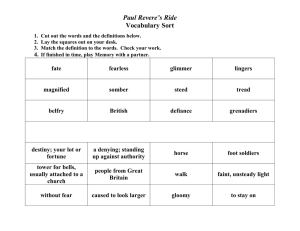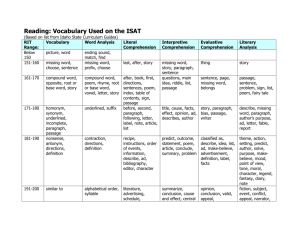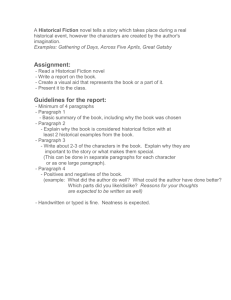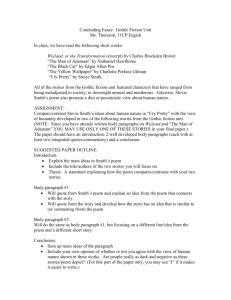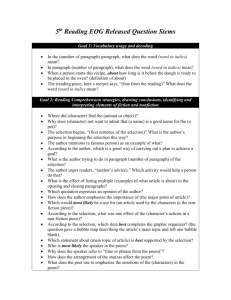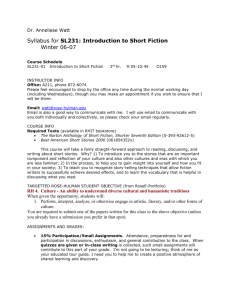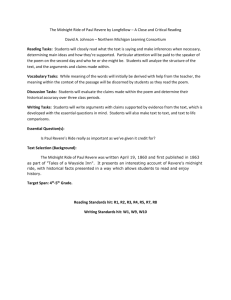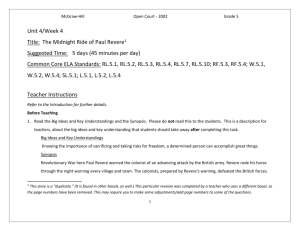4th Grade Reading List
advertisement
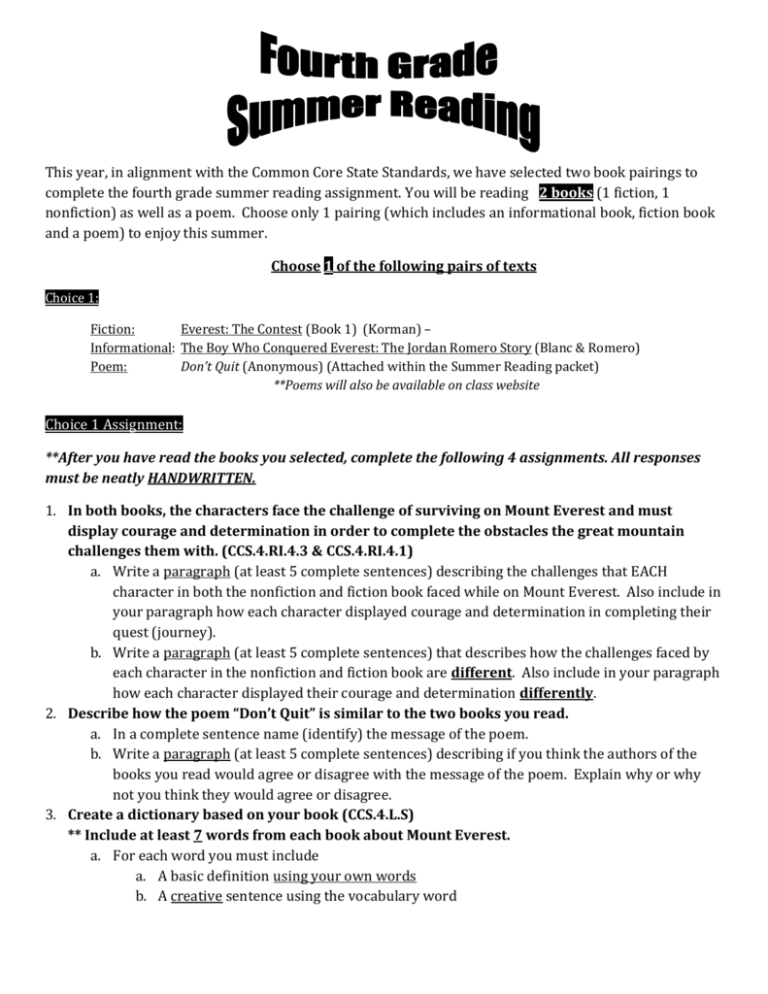
This year, in alignment with the Common Core State Standards, we have selected two book pairings to complete the fourth grade summer reading assignment. You will be reading 2 books (1 fiction, 1 nonfiction) as well as a poem. Choose only 1 pairing (which includes an informational book, fiction book and a poem) to enjoy this summer. Choose 1 of the following pairs of texts Choice 1: Fiction: Everest: The Contest (Book 1) (Korman) – Informational: The Boy Who Conquered Everest: The Jordan Romero Story (Blanc & Romero) Poem: Don’t Quit (Anonymous) (Attached within the Summer Reading packet) **Poems will also be available on class website Choice 1 Assignment: **After you have read the books you selected, complete the following 4 assignments. All responses must be neatly HANDWRITTEN. 1. In both books, the characters face the challenge of surviving on Mount Everest and must display courage and determination in order to complete the obstacles the great mountain challenges them with. (CCS.4.RI.4.3 & CCS.4.RI.4.1) a. Write a paragraph (at least 5 complete sentences) describing the challenges that EACH character in both the nonfiction and fiction book faced while on Mount Everest. Also include in your paragraph how each character displayed courage and determination in completing their quest (journey). b. Write a paragraph (at least 5 complete sentences) that describes how the challenges faced by each character in the nonfiction and fiction book are different. Also include in your paragraph how each character displayed their courage and determination differently. 2. Describe how the poem “Don’t Quit” is similar to the two books you read. a. In a complete sentence name (identify) the message of the poem. b. Write a paragraph (at least 5 complete sentences) describing if you think the authors of the books you read would agree or disagree with the message of the poem. Explain why or why not you think they would agree or disagree. 3. Create a dictionary based on your book (CCS.4.L.S) ** Include at least 7 words from each book about Mount Everest. a. For each word you must include a. A basic definition using your own words b. A creative sentence using the vocabulary word Choice 2: Fiction: Informational: Poem: George Washington’s Socks (Woodruff) – Or The Redcoats Are Coming (Hering & Sanders) Can’t You Make Them Behave, King George? (Fritz) The Midnight Ride of Paul Revere (Longfellow) (attached within the Summer Reading packet) **Poems will also be available on class website Choice 2 Assignment: **After you have read the books you selected, complete the following 4 assignments. All responses must be neatly HANDWRITTEN. 1. Both books discuss the American Revolution and how it affected the colonists and the English. COMPARE and CONTRAST. (CCS.4.RI.4.3 & CCS.4.RI.4.1) a. Write a paragraph (at least 5 complete sentences), which describes how the information in the nonfiction book and the fiction book describe or explain the events of the American Revolution in a similar way. Also describe the how the feelings of the people involved were similar in each book. Be sure to include at least 2 examples to support your answer. b. Write a paragraph (at least 5 complete sentences) describing how information in the nonfiction book and the fiction books describe the events of the American Revolution differently. Also include how the feelings of the people involved were different. 2. Describe how the poem, “The Midnight Ride of Paul Revere” is similar to the two books you read. a. Write a paragraph (at least 5 complete sentences) describing if you think the poet, Henry Wadsworth Longfellow, was a Patriot or a Loyalist. b. Explain why you think Paul Revere is considered a Revolutionary War hero. (At least 4 – 5 complete sentences) 3. Create a dictionary based on your book (CCS. 4.L.6) ** Include at least 10 words from each book about colonial life and the Revolutionary War. a. For each word you include i. Write a basic definition using your own words ii. Write a creative sentence using the vocabulary word. Paul Revere's Ride Henry Wadsworth Longfellow Listen my children and you shall hear Of the midnight ride of Paul Revere, On the eighteenth of April, in Seventy-five; Hardly a man is now alive Who remembers that famous day and year. He said to his friend, "If the British march By land or sea from the town to-night, Hang a lantern aloft in the belfry arch Of the North Church tower as a signal light,-One if by land, and two if by sea; And I on the opposite shore will be, Ready to ride and spread the alarm Through every Middlesex village and farm, For the country folk to be up and to arm." Then he said "Good-night!" and with muffled oar Silently rowed to the Charlestown shore, Just as the moon rose over the bay, Where swinging wide at her moorings lay The Somerset, British man-of-war; A phantom ship, with each mast and spar Across the moon like a prison bar, And a huge black hulk, that was magnified By its own reflection in the tide. Meanwhile, his friend through alley and street Wanders and watches, with eager ears, Till in the silence around him he hears The muster of men at the barrack door, The sound of arms, and the tramp of feet, And the measured tread of the grenadiers, Marching down to their boats on the shore. Then he climbed the tower of the Old North Church, By the wooden stairs, with stealthy tread, To the belfry chamber overhead, And startled the pigeons from their perch On the sombre rafters, that round him made Masses and moving shapes of shade,-By the trembling ladder, steep and tall, To the highest window in the wall, Where he paused to listen and look down A moment on the roofs of the town And the moonlight flowing over all. Beneath, in the churchyard, lay the dead, In their night encampment on the hill, Wrapped in silence so deep and still That he could hear, like a sentinel's tread, The watchful night-wind, as it went Creeping along from tent to tent, And seeming to whisper, "All is well!" A moment only he feels the spell Of the place and the hour, and the secret dread Of the lonely belfry and the dead; For suddenly all his thoughts are bent On a shadowy something far away, Where the river widens to meet the bay,-A line of black that bends and floats On the rising tide like a bridge of boats. Meanwhile, impatient to mount and ride, Booted and spurred, with a heavy stride On the opposite shore walked Paul Revere. Now he patted his horse's side, Now he gazed at the landscape far and near, Then, impetuous, stamped the earth, And turned and tightened his saddle girth; But mostly he watched with eager search The belfry tower of the Old North Church, As it rose above the graves on the hill, Lonely and spectral and sombre and still. And lo! as he looks, on the belfry's height A glimmer, and then a gleam of light! He springs to the saddle, the bridle he turns, But lingers and gazes, till full on his sight A second lamp in the belfry burns. A hurry of hoofs in a village street, A shape in the moonlight, a bulk in the dark, And beneath, from the pebbles, in passing, a spark Struck out by a steed flying fearless and fleet; That was all! And yet, through the gloom and the light, The fate of a nation was riding that night; And the spark struck out by that steed, in his flight, Kindled the land into flame with its heat. He has left the village and mounted the steep, And beneath him, tranquil and broad and deep, Is the Mystic, meeting the ocean tides; And under the alders that skirt its edge, Now soft on the sand, now loud on the ledge, Is heard the tramp of his steed as he rides. It was twelve by the village clock When he crossed the bridge into Medford town. He heard the crowing of the cock, And the barking of the farmer's dog, And felt the damp of the river fog, That rises after the sun goes down. It was one by the village clock, When he galloped into Lexington. He saw the gilded weathercock Swim in the moonlight as he passed, And the meeting-house windows, black and bare, Gaze at him with a spectral glare, As if they already stood aghast At the bloody work they would look upon. It was two by the village clock, When he came to the bridge in Concord town. He heard the bleating of the flock, And the twitter of birds among the trees, And felt the breath of the morning breeze Blowing over the meadow brown. And one was safe and asleep in his bed Who at the bridge would be first to fall, Who that day would be lying dead, Pierced by a British musket ball. You know the rest. In the books you have read How the British Regulars fired and fled,--How the farmers gave them ball for ball, >From behind each fence and farmyard wall, Chasing the redcoats down the lane, Then crossing the fields to emerge again Under the trees at the turn of the road, And only pausing to fire and load. So through the night rode Paul Revere; And so through the night went his cry of alarm To every Middlesex village and farm,--A cry of defiance, and not of fear, A voice in the darkness, a knock at the door, And a word that shall echo for evermore! For, borne on the night-wind of the Past, Through all our history, to the last, In the hour of darkness and peril and need, The people will waken and listen to hear The hurrying hoof-beats of that steed, And the midnight message of Paul Revere.
